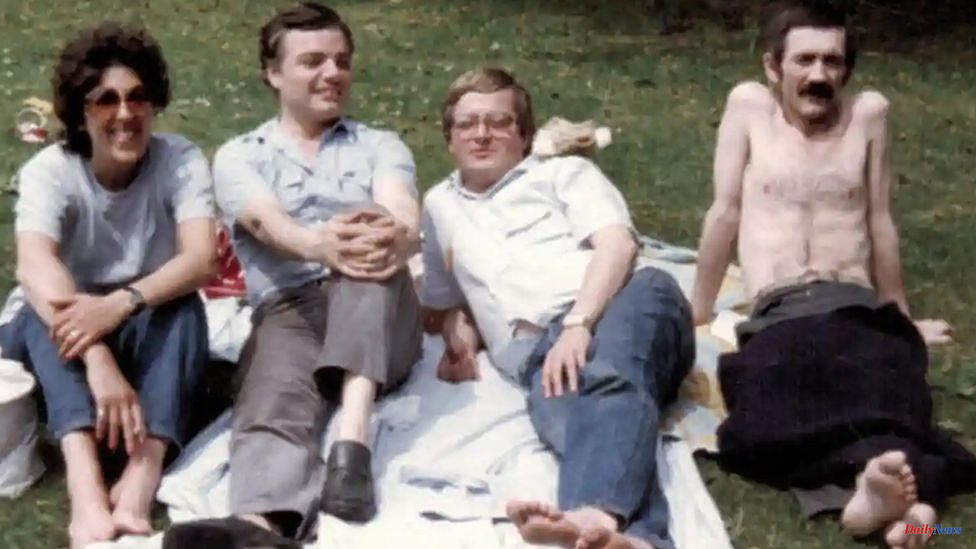Terrence Higgins may be a familiar name, and you might have some idea of his legacy.
He was charismatic and fun-loving, loved by his close friends, but it wasn't until his death that his name was known around the world.
Few people know about his "wiggle legs", his unique dance and the astrology book that he wrote. He also revealed that his sexuality led to his move to a city where he could be himself.
Terry, as he was called, was famous for his death, but he also lived.
Terry is synonymous with fighting HIV/AIDS and Aids. He was the first person to die from an Aids-related disease in the UK.
When he died at 37, the HIV virus was unknown to anyone.
The close friends and family who knew him well wanted to change not only that but also the way the world treated an illness that few people knew about.
Stars and royalty regularly support the charity that honors Terry, whose death was the unfortunate catalyst for medical research that led to subsequent treatment.
Terry's estate received the proceeds from two musical anthems, Queen's Bohemian Rhapsody by Elton John and George Michael, within 10 years of Terry's passing. These were donated to the Terrence Hickgins Trust.
Terry's support and gestures, along with work to promote good sexual health and help HIV-positive people, have made Terry's charity a leading HIV charity in the world.
The journey began in June 1945, just before the end World War Two. It was in west Wales.
Terrence Lionel S. Higgins was born in Haverfordwest, Pembrokeshire to Marjorie. Terry's father wasn't listed on Terry's birth certificate.
Angela Preston, a school friend, remembers him dancing in the town's halls as a teenager.
She told BBC Sounds A Positive Life podcast that her friend would tell me "come on girls," and that he'd say it to me. Sam Smith was the narrator.
He was brilliant. He could be seen walking down the high street with his pants flapping. He was a dancer. They are light and airy, they have that floating motion.
"To me, he was Terry with whom I danced on Saturday nights.
He had an air about him that was not repressed. He got on with his life and seemed to enjoy every moment of it - and he even had a beautiful smile. He was a wonderful boy.
"I discovered that he was gay only after he had died." It was shocking because I had no idea.
Terry was a child in the 1950s when gay sex was still illegal. You could even be sent to prison. These laws changed only in 1967, and even then, only partially.
"We would play in a field that was part of the council estate, and Terry would occasionally come down," stated Billy Yabsley who was a neighbor who lived on Terry’s street Priory Avenue.
"I was 10, and he was 14, He was not a mixer. Terry was rare to come out.
Terry was quiet and never became involved in any of this.
"I used go to the market hall, and they would turn it into a dancing room. I can still remember him dancing, he was truly amazing. He was like a farmer in boots, but when he danced, it was like a ballerina.
Terry used to play the piano, and Bill recalled that Terry was also a talented boy who excelled at school. He won the senior long jump competition at Haverfordwest Grammar Boys School in the 1950s.
Terry began his life in West Wales during a time when being gay to family or friends was considered risky. At the time, attitudes toward homosexuality were very different.
Angela said, "I would have thought that it would have been dreadfully hard because there was such stigma attached."
Terry, who had just finished school in the 60s, left Haverfordwest for the Royal Navy. He lost touch with his school friends and was soon separated from his family. However, Terry donated his stationary and books to the school library.
Terry's cousin Annie Oakley said that Terry would visit her often when he was in navy. Annie now lives in Australia.
"I thought he looked so handsome because he had dark hair and had creases on his trousers from the way they used to fold them when they were in navy.
"My earliest memory is when he visited us. He was in our front yard, swinging us about... and letting us dance on him feet because he was always dancing."
Annie believes Terry, an only child, never revealed his identity to his family. However, he didn't completely hide his personal life from them.
She recalled, "When I was 14 years old, I stayed at Auntie Marj's. Terry was visiting and had a friend."
"It didn't occur to me that he had sexual preference and she asked Terry if he would like to have a cup of tea.
"I walked into the bedroom and saw Terry and his friend in bed. I said, "Here's a cup of tea." I was unaware."
Terry visited his mother in his hometown every once in a while before her death in 1974.
Linda Payan, Terry's only close friend from London, said that Terry didn't talk much about his family. Linda was one of Terry's closest friends who returned to Haverfordwest with Terry.
His mother was a female Terry. You could clearly see that they were father and son. She was great fun and had a similar sense of humor to Terry.
She could be very rude to him, and she could be quite cutting. That kind of relationship would they have? Although they weren't close, they were able to enjoy each other's company."
Linda claimed that Marjorie thought Marjorie knew her son gay because she had once gone back to Terry's childhood home along with his boyfriend and Terry - but nothing was said.
Linda said that Linda would have kept the conversation quiet because it was an older time and not accepted. It was taboo."
Terry had by now made London his home. He enjoyed dancing to disco music, and felt free to do what he liked, which sometimes meant being a wheeler-dealer.
Linda said that Terry was either rich or poor. She first met Terry at a Wimpy restaurant in 1969 after a night out.
"When he wasn't able to pay the bills, I would see him more because he had jewellery to sell. He would say, "Can you give me some money?" He'd say, "Can you give me some money for them?" It would be a fiver to tenner for all the silver.
He was kind and generous. He was generous with his money whenever he had it.
Terry was a journalist and wrote Hansard, which is the official report of each parliamentary debate in House of Commons. This meant that Terry worked in the same place that made his sexuality a crime.
Linda recalled that "He was a bit paranoid" about being discovered to be gay.
"Once he had said, 'I have some people from work coming to dinner, could you pretend that I'm your wife?" "So I did."
Terry, a Gemini, was interested in astrology. He wrote The Living Zodiac, a book about the subject. He also loved socializing.
Linda said, "I used to call his wiggle legs." Linda said, "He had these wiggly leg when he danced and it always made us laugh... his legs never seemed like they would separate but his knees were still together.
He said that life was exciting because he was always seeking new adventures.
I told him, "You're either going be very famous or you'll end up on a bench." Terry laughed at that joke. Terry was still famous."
Terry made friends in gay clubs with Martyn Butler and Rupert Whitaker, two men who would make Terrence Higgins famous all over the world.
Martyn, 20 years older than Terry, said Martyn that he liked Terry because he cared about people.
He'd tell you off if you were being misbehaving. He was a little motherly like that.
Rupert was just 18 when he began a relationship Terry. He was attracted to Terry's streetwise personality in a time when their community was marginalised.
Rupert said, "He didn’t care about anything. He was completely unselfconscious."
"He was very skeptical of pretentiousness and had a healthy attitude."
He was absolutely stunning. This was the age of the clones... short, cropped hair, big moustache and strong five-o'clock shadow. Plaid shirts, tight jeans, and builder's shoes were all part of this era.
"It was a masculine look that I loved and it made me feel completely at home."
They became one "family" within a London community that was already feeling on the outside. It was only going to get worse.
Both were HIV-positive when they first met but neither knew it.
Although no one knew it, this wave of epidemic was coming.
Terry died 18 months after their first meeting at Bangs, a nightclub in London's Tottenham Court Road.
Rupert said that he didn't really talk about it. It was almost as if he was an indifferent witness to his own degrading.
Terry's illness grew more severe in the spring 1982. He collapsed at London's Heaven nightclub, and was taken to hospital.
Rupert said, "Only relatives could visit." "I told him he doesn't have any relatives, I'm his girlfriend" so the nurses were fine with it, but the doctors didn't speak to me.
'Gay cancer'
"A gay newspaper published this report at the time... on what was then gay cancer, and pneumonia. Although we knew this was an American phenomenon, nobody knew it was also in Europe.
Terry was a pretty certain man. He'd gone downhill so quickly."
Rupert was celebrating Independence Day with American friends on July 4, 1982, when he stopped by Terry with "ice lollies," Lucozade, and Tizer.
Those drinks remained undrunk. Terry died that evening.
Rupert confessed that he knew that he loved me, but he didn't love me.
"I had to ask two of his friends, and they looked at my crazy face because they said, 'oh yeah. Very, very much.'
"Just before he passed away, it seemed that he was calling for me. It is a great regret that I was late.
"The impact it had on my life for the rest of mine was incredible. It changed my life. It's a blessing that I was able to use it to help someone else.
Doctors were not sure how to diagnose and treat the new condition at the time. There was also fear in the community about the condition.
A group of friends who were left with no other options but to grieve and want to fight the unknown illness created a trust in Martyn’s Limehouse, East London, within weeks of Terry's funeral.
Rupert recalled, "I felt that I was expected to die already."
"I expect to die. I expect myself to do die. What should I do? What do I do? Do I wait and see what happens or do I do something with my time?"
They decided to personalize Terry's trust so that they could have a greater impact.
Since then, the Terrence Higgins trust has helped thousands of people and provided services such as HIV testing and sexual health care. It is one of the most respected HIV and Aids charities in the world.
The BBC Action Line provides links to organizations that can provide support and advice for anyone who has been affected by the issues described in this article.












